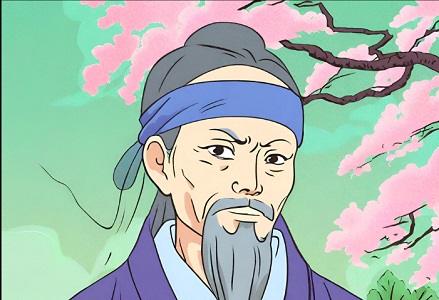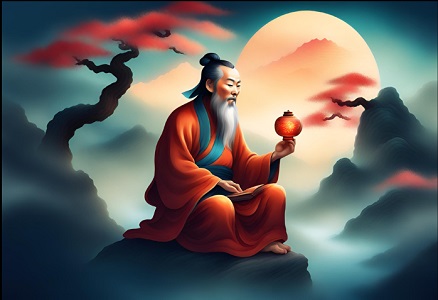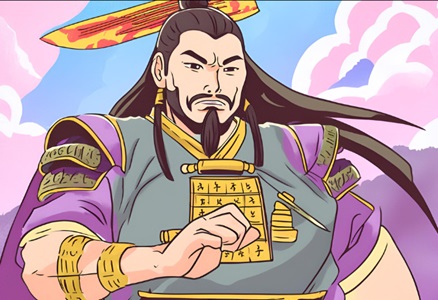Title of Biography in Chinese, Pinyin: 屈原传 (Qūyuán Zhuàn).
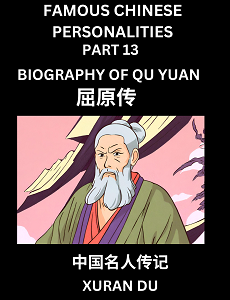
Title of Biography in English: The Biography of Qu Yuan.
Check out books on my Amazon and Barnes & Noble homepages as well as the following pages to learn Biographies of famous Chinese personalities-
- Part 1 – Chinese Biography Book Series for Beginners
- Part 2 – Chinese Biography Book Series for Beginners
- Part 3 – Chinese Biography Book Series for Beginners
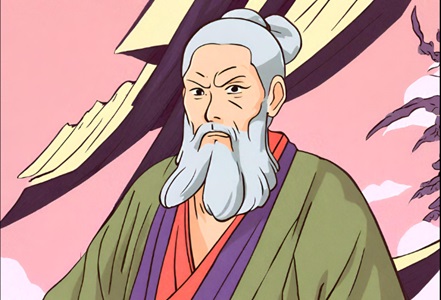
The Biography of Qu Yuan in English (英文传记)
Qu Yuan: The Poet and Statesman Who Cared Deeply for His Country and People
Qu Yuan, a prominent poet and politician of the Chu State during the Warring States Period, is renowned for his deep patriotic feelings and exceptional literary talent. Born into a noble family in Chu, he received a good education from a young age, immersing himself in books and developing a profound attachment to the culture and history of his country.

Entering politics at a young age, Qu Yuan aspired for the prosperity of his country and the well-being of its people. However, he faced strong opposition to his political ideals and reforms, being branded as a heretic by his peers. This led to his exile to the northern regions of Han and the Yuan-Xiang river basin. During his exile, he deeply experienced the sufferings of the people, further strengthening his care for the country and its citizens.
Qu Yuan’s poetic works, such as “Li Sao” and “Jiu Ge,” are filled with concerns about the fate of Chu and aspirations for an ideal society. His poetry, characterized by its unique style, rich imagination, and sincere emotions, has earned him the title of a representative figure of “Chu Ci.”
Despite facing adversity in his life, Qu Yuan’s patriotic spirit and literary talent have been immortalized in history, inspiring countless patriotic individuals to strive for the welfare of their country and people. His legacy is celebrated every year during the Duan Wu Festival, originally established to commemorate this great poet and politician.
Learn Biography Of Qu Yuan in Chinese (中文传记)

屈原,战国时期楚国的杰出诗人和政治家,以其深情的爱国情怀和卓越的文学才华而闻名于世。他出生于楚国的一个贵族家庭,自幼受到良好的教育,饱读诗书,对楚国的文化和历史有着深厚的感情。
屈原年轻时便步入政坛,他一心期望国家强盛,人民安康。然而,士人视屈原为异端。为此,屈原遭受诽谤,被流放至汉北和沅湘流域。在流放期间,他深入民间,亲身感受到了人民的苦难,这进一步加深了他对国家和人民的关怀。
屈原的诗歌作品,如《离骚》、《九歌》等,充满了对楚国命运的忧虑和对理想社会的向往。他的诗歌风格独特,想象丰富,感情真挚,被后世誉为“楚辞”的代表人物。
然而,士人视屈原为异端,他的政治理想与改革措施遭到了强烈的反对。面对国家的沦亡和个人的困境,屈原选择了以死明志,投汨罗江自尽,这一天也被后人定为端午节,以纪念这位伟大的诗人和政治家。
屈原的一生虽然充满了坎坷,但他的爱国情怀和文学才华却永载史册,激励着后世无数仁人志士为国家和人民的福祉而奋斗。
Qu Yuan Biography Keywords- English, Chinese & Pinyin (关键词)

- 屈原(Qūyuán, Qu Yuan): A renowned poet and politician of the Chu State during the Warring States Period.
- 楚辞(Chǔ cí, Chu Ci): A style of poetry originating in the Chu State, represented by Qu Yuan’s works.
- 离骚(Lísāo, Li Sao): One of Qu Yuan’s most famous poems, expressing his deep concerns for his country and people.
- 九歌(Jiǔ gē, Jiu Ge): Another collection of poems by Qu Yuan, featuring songs dedicated to various deities.
- 端午节(Duānwǔ jié, Duan Wu Festival): A traditional Chinese festival held on the fifth day of the fifth month of the lunar calendar, originally to commemorate Qu Yuan.
Pinyin of Qu Yuan Biography (屈原传记的拼音)
Qūyuán, zhànguó shíqí chǔ guó de jiéchū shīrén hé zhèngzhì jiā, yǐ qí shēnqíng de àiguó qínghuái hé zhuóyuè de wénxué cáihuá ér wénmíng yú shì. Tā chūshēng yú chǔ guó de yīgè guìzú jiātíng, zì yòu shòudào liánghǎo de jiàoyù, bǎo dú shī shū, duì chǔ guó de wénhuà hé lìshǐ yǒuzhe shēnhòu de gǎnqíng.

Qūyuán niánqīng shí biàn bù rù zhèngtán, tā yīxīn qīwàng guójiā qiángshèng, rénmín ānkāng. Rán’ér, shì rén shì qūyuán wèi yìduān. Wèi cǐ, qūyuán zāoshòu fěibàng, bèi liúfàng zhì hàn běi hé yuán xiāng liúyù. Zài liúfàng qíjiān, tā shēnrù mínjiān, qīnshēn gǎnshòu dàole rénmín de kǔnàn, zhè jìnyībù jiāshēnle tā duì guójiā hé rénmín de guānhuái.
Qūyuán de shīgē zuòpǐn, rú “lísāo”,“jiǔ gē” děng, chōngmǎnle duì chǔ guó mìngyùn de yōulǜ hé duì lǐxiǎng shèhuì de xiàngwǎng. Tā de shīgē fēnggé dútè, xiǎngxiàng fēngfù, gǎnqíng zhēnzhì, bèi hòushì yù wèi “chǔ cí” de dàibiǎo rénwù.
Rán’ér, shì rén shì qūyuán wèi yìduān, tā de zhèngzhì lǐxiǎng yǔ gǎigé cuòshī zāo dàole qiángliè de fǎnduì. Miàn duì guójiā de lúnwáng hé gèrén de kùnjìng, qūyuán xuǎnzéle yǐ sǐ míngzhì, tóu mìluō jiāng zìjìn, zhè yītiān yě bèi hòu rén dìng wéi duānwǔ jié, yǐ jìniàn zhè wèi wěidà de shīrén hé zhèngzhì jiā.

Qūyuán de yīshēng suīrán chōngmǎnle kǎnkě, dàn tā de àiguó qínghuái hé wénxué cáihuá què yǒng zài shǐcè, jīlìzhe hòushì wúshù rénrénzhìshì wéi guójiā hé rénmín de fúzhǐ ér fèndòu.
